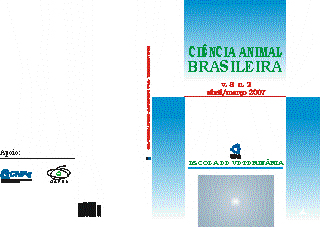RICE BRAIN UTILIZATION IN COMMERCIAL LAYING HENS DIETS FORMULATED ON TOTAL AND DIGESTIBLE AMINO ACID BASIS
DOI:
https://doi.org/10.5216/cab.v8i3.1677Keywords:
Alimentação de aves, formulação de raçõesAbstract
The objective of this study was evaluate the per-formance, egg quality and production costs of commercial laying hens fed with rice meal and formulated on total and digestible amino acids basis. During 5 periods of 28 days 192 Lohmann LSL hens 25 weeks of age were distributed in a completely random experiment in a factorial scheme with 8 treatments and 3 replications of 8 birds each. The factorial scheme consisted in two amino acid recommen-dation (total and digestible) and four inclusion levels of rice meal (0, 5, 10 and 15%). The performance and egg quality were evaluated during five cycles of 28 days. Un-der the conditions of this experiment, the use of digest-ible amino acid values determined low performance and higher production cost in comparison with the total amino acid values. The diets formulated with different rice meal levels did not affected performance and egg quality pa-rameters evaluated, however, the use of rice meal in lay-ing hens diets should be determined depending on avail-ability and cost, while was observed over 6% of inclusion the egg production costs was increased.
KEY-WORDS: Alternative feed, amino acid recommendation, egg quality, performance.
Downloads
Downloads
Published
How to Cite
Issue
Section
License
Authors who publish with this journal agree to the following terms:
- Authors retain copyright and grant the journal right of first publication with the work simultaneously licensed under a Creative Commons Attribution License that allows others to share the work with an acknowledgement of the work's authorship and initial publication in this journal.
- Authors are able to enter into separate, additional contractual arrangements for the non-exclusive distribution of the journal's published version of the work (e.g., post it to an institutional repository or publish it in a book), with an acknowledgement of its initial publication in this journal.
- Authors are permitted and encouraged to post their work online (e.g. in institutional repositories or on their website) prior to and during the submission process, as it can lead to productive exchanges, as well as earlier and greater citation of published work (See The Effect of Open Access).




























